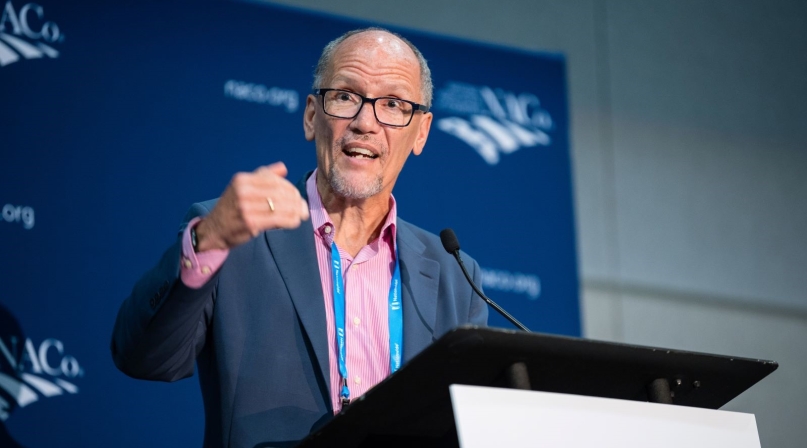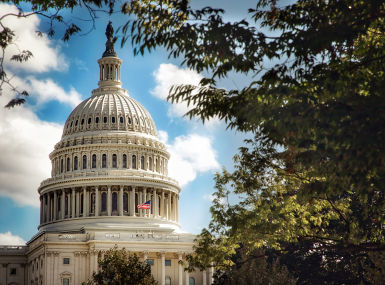White House Advisor Tom Perez to county officials: ‘Let’s keep the momentum going’

Key Takeaways
Twenty years from now, will county officials look back and say they seized the day for their constituents?
That’s what White House Intergovernmental Affairs Director Tom Perez is hoping.
Perez, speaking to the NACo Board of Directors July 23 in Travis County, Texas, ticked off a laundry list of legislation designed to help the American people post-pandemic.
“When I reflect on what’s been done over the last few years, from the American Rescue Plan, the Bipartisan Infrastructure Bill, to the broadband opportunities, the Inflation Reduction Act, there are so many opportunities to build community,” he said.
Although he now has the ear of the president, Perez’ roots are in county government.
He was the first Latino elected to the Montgomery County Council in Maryland in 2002. After that he worked as a civil rights attorney in the Department of Justice and Secretary of Labor in the Obama administration, from 2013 to 2017.
“It’s an honor to be here, it’s an honor to be back,” he told his NACo audience. “Because 20 years ago, I was coming to these conferences and I was always feeling at the end that I learned far more than I imparted.”
Perez, a native of Buffalo, N.Y., said the one thing he learned early on in life, “especially in the world of governance,” is the importance of understanding the moment in time you’re living in. “…and to seize that moment, because you don’t want to look back years later and say, ‘We had this opportunity that was unbelievable in scale and scope, but we didn’t seize it.’”
“The last time we had an opportunity of such scale and scope to transform communities was in 1932 when the New Deal came,” he noted. “We had some opportunities during the Great Society [1965] as well.”
Perez noted some of the good things happening under the Biden administration, including the impact of the 2021 expansion of the Child Tax Credit, which reduced childhood poverty by 40 percent, he said. “One thing we know right now is that we know how to reduce childhood poverty, significantly, because we did it...that’s a big deal!”
“So here we are, and we have only begun those investments and the reason I’m here is to make sure, that you know you are indispensable partners in these efforts,” he said.
“I was just talking to a judge from Bend County in Texas, he was telling me they used some of their ARPA funds to help restaurants stay afloat,” Perez said.
“They figured out who their food insecure people were, and they paid the restaurants to feed those people. That’s what it’s all about. I come to you with gratitude not only for what you have done but how you have done it.”
But Perez noted there is “unfinished business” when it comes to mental health. “It’s not just a healthcare imperative. I would say it’s a moral imperative to continue our work building out a mental health infrastructure. That is absolutely one of the unfinished pieces of business from this pandemic.”
On July 25, President Biden announced new action to guarantee access to mental health care, unveiling a proposed rule that would ensure mental health benefits on private insurance plans more closely mirror physical health benefits.
“Fentanyl is another example,” Perez said.
“These issues we’re talking about — they’re not Republican, they’re not Democrat. I lost my niece, who was my goddaughter, very suddenly. This is ripping communities apart and we have got to get a better handle on it. It’s a four-legged stool: It’s the federal government, our state and local partners, our non-profit partners, parents and advocates and foreign governments as well. You are one of the indispensable partners in that.”
Perez also talked about the challenges of writing grant submissions for ARPA funding. “I’ve heard from a number of counties, because they don’t necessarily have that robust grant writing team and the ability to get the money shouldn’t depend on the ability to have the grant writer. It should depend on the quality of your project. We’ve got a lot of work to do.”
“We need to be doing this together,” he said. “There are a lot of people who are sick and tired of being sick and tired, of our politics.”
Perez said he was talking with Utah Gov. Spencer Cox, president of the National Governors’ Association, and noted that the governor’s signature initiative is “learning how to disagree without being disagreeable.”
“I told him a story about someone I had worked for, a guy named Ted Kennedy. I worked for him in the U.S. Senate, from 1995 to 1998. One of his closest friends in life was a guy named Orrin Hatch, then a Republican U.S. senator. People used to ask him, ‘Is this friendship contrived or is this real? The answer is, it was very real.”
“We have a children’s health insurance program today because Sen. Kennedy and Sen. Hatch came together,” Perez said.
“We have a Hate Crime Statistics Act because they came together. We may not agree on everything, but we can disagree while still being respectful.”
“That’s one of the reasons why I’m excited to be here. Because you have set that tone in the work that you do. I know when I was on the county council, one of my closest allies was my Republican colleague whose district abutted mine.
Perez reflected on the nation’s unemployment figures but also acknowledged there is work to do for local government hiring — local governments have yet to recover 162,000 jobs compared to pre-pandemic levels. “…we still, by the way, gotta work on making sure that public-sector employment continues to rise, he said.
“The last jobs report was promising,” he noted, “but that’s the one area where we still have work to do and you know that, because you’re confronting those challenges day in and day out. As your former Labor secretary, I’m acutely aware of that.”
“So, let’s keep this momentum going, let’s collectively resolve to reach a point when we can look back in 20 years and say that moment in time when we had opportunity unprecedented since the New Deal, was a moment in time that we seized, and we expanded opportunities.”
“We built an America where ZIP code didn’t determine destiny, we built an America where equity really was something that wasn’t aspired to but something that was realized. We built jobs in rural, urban, suburban, exurban America. We built an America that worked for everyone. That’s what our work together means.”
Resource
2023 Federal Policy Priorities








